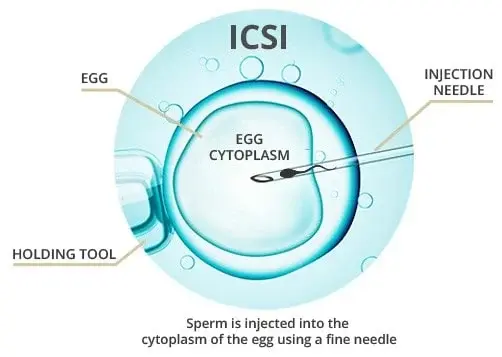
🩺 What is ICSI?
Intracytoplasmic Sperm Injection (ICSI) is a widely used and highly effective fertility treatment specifically designed to address male infertility issues. It is often recommended for couples who have previously failed to achieve fertilization through traditional IVF. During ICSI, a single healthy sperm is directly injected into the egg to facilitate fertilization.In some cases, men with low sperm count or sperm motility issues may require surgical sperm retrieval before the ICSI procedure. This technique significantly improves the chances of successful fertilization, even when sperm quality is compromised. 🌸
🩺 Intracytoplasmic Sperm Injection (ICSI): Overview
Intracytoplasmic Sperm Injection (ICSI) is an advanced fertility procedure used during In Vitro Fertilization (IVF) to enhance the chances of fertilization. It involves the direct injection of a single healthy sperm into a mature egg using a fine needle, bypassing the natural fertilization process. This technique is commonly recommended for male infertility issues or cases where traditional IVF methods have not been successful.
✅ When is ICSI Recommended?
ICSI is often used in the following situations:
- Male Infertility: Low sperm count, poor motility, or abnormal shape (morphology).
- Poor Fertilization History: When previous IVF cycles failed to achieve fertilization.
- Sperm Retrieval Procedures: In cases of obstructive azoospermia, where sperm are surgically retrieved.
- Unexplained Infertility: When no clear cause of infertility is identified.
- Frozen Sperm or Eggs: When using previously frozen sperm or eggs, as they may have lower fertilization potential.
🔍 ICSI Procedure: Step-by-Step
- Ovarian Stimulation:
- The woman undergoes hormonal stimulation to produce multiple eggs.
- Follicular monitoring is performed through ultrasounds and blood tests.
- Egg Retrieval:
- Mature eggs are collected from the ovaries through a minor surgical procedure called follicular aspiration.
- Sperm Collection and Selection:
- A sperm sample is obtained through ejaculation or surgical retrieval.
- The healthiest and most motile sperm are selected for injection.
- Sperm Injection:
- Using a fine needle, a single sperm is injected directly into the cytoplasm of each egg.
- Fertilization and Embryo Development:
- The fertilized eggs (embryos) are monitored for 3-5 days to track their growth.
- Embryo Transfer:
- The best-quality embryo(s) are transferred into the uterus to achieve pregnancy.
💉 Benefits of ICSI
- Higher Fertilization Rates: ICSI significantly increases the chances of fertilization, even with low-quality sperm.
- Treats Severe Male Infertility: Overcomes issues like low sperm count, poor motility, or DNA fragmentation.
- Improved IVF Success: Ideal for couples with previous failed IVF cycles.
- Use with Frozen Sperm or Eggs: Ensures successful fertilization even with preserved samples.
🚫 Risks and Limitations of ICSI
- Egg Damage: The egg may be damaged during the injection process.
- Embryo Quality Issues: Not all eggs fertilize successfully, which may reduce the number of viable embryos.
- Birth Defects: Slightly higher risk of genetic abnormalities in children conceived through ICSI, though still rare.
- Multiple Pregnancy Risk: If multiple embryos are transferred, the chances of twins or triplets increase.
📊 ICSI Success Rates
The success rate of ICSI depends on factors such as:
- Maternal age: Women under 35 years have a higher success rate.
- Sperm and egg quality: Healthy sperm and eggs improve fertilization chances.
- Clinic expertise: Success rates vary based on the fertility clinic’s experience.
On average, ICSI success rates range from:
- 40-45% per cycle for women under 35.
- 30-35% for women aged 35-40.
- 15-20% for women over 40.
🌟 Key Takeaway
ICSI is a highly effective fertility technique that improves fertilization rates by directly injecting sperm into the egg. It is particularly beneficial for couples dealing with male infertility, poor fertilization history, or using frozen sperm/eggs. Though it carries some risks, it offers hope for couples struggling with conception through traditional IVF methods. 🌸


